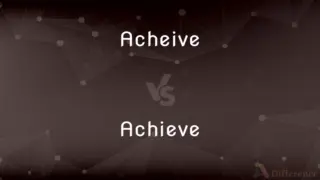Engeneer vs. Engineer — Which is Correct Spelling?
Edited by Tayyaba Rehman — By Fiza Rafique — Updated on March 30, 2024
"Engeneer" is incorrect; the correct spelling is "engineer," denoting a professional in design and machinery.

Table of Contents
Which is correct: Engeneer or Engineer
How to spell Engineer?

Engeneer
Incorrect Spelling

Engineer
Correct Spelling
ADVERTISEMENT
Key Differences
Recall that "engineers" work with "engines," not "engenes."
Think of "engineer" as a driver of an "engine."
There's only one "e" after "engin" in "engineer."
Remember "engineer" starts with "engine."
An "engineer" designs, and "design" also has a single 'e' in its middle.
ADVERTISEMENT
How Do You Spell Engineer Correctly?
Incorrect: The engeneer designed a new type of bridge.
Correct: The engineer designed a new type of bridge.
Incorrect: He aspires to become an engeneer after graduating.
Correct: He aspires to become an engineer after graduating.
Incorrect: She hired an engeneer to fix the problem with her car.
Correct: She hired an engineer to fix the problem with her car.
Incorrect: An engeneer will assess the safety of the building.
Correct: An engineer will assess the safety of the building.
Engineer Definitions
Engineer can be a train driver.
Examplehe engineer blew the train's whistle.
Engineer implies devising or modifying for a particular purpose.
Examplehe system was engineered to improve efficiency.
Engineer means to skillfully arrange or manage something.
Examplehey engineered a victory in the final game.
One who is trained or professionally engaged in a branch of engineering.
One who operates an engine.
One who skillfully or shrewdly manages an enterprise.
To plan, construct, or manage as an engineer.
To alter or produce by methods of genetic engineering
Bacteria that are genetically engineered to produce insulin.
To plan, manage, and bring about by skillful acts or contrivance
Engineer a business takeover.
Engineer social changes by legislation.
A soldier engaged in designing or constructing military works for attack or defence, or other engineering works.
(obsolete) A soldier in charge of operating a weapon; an artilleryman, a gunner.
(by extension)
A person professionally engaged in the technical design and construction of large-scale private and public works such as bridges, buildings, harbours, railways, roads, etc.; a civil engineer.
Originally, a person engaged in designing, constructing, or maintaining engines or machinery; now (more generally), a person qualified or professionally engaged in any branch of engineering, or studying to do so.
A person trained to operate an engine; an engineman.
Preceded by a qualifying word: a person who uses abilities or knowledge to manipulate events or people.
A political engineer
A person who formulates plots or schemes; a plotter, a schemer.
(transitive)
To employ one's abilities and knowledge as an engineer to design, construct, and/or maintain (something, such as a machine or a structure), usually for industrial or public use.
(specifically) To use genetic engineering to alter or construct (a DNA sequence), or to alter (an organism).
To plan or achieve (a goal) by contrivance or guile; to finagle, to wangle.
(intransitive)
To formulate plots or schemes; to plot, to scheme.
(rare) To work as an engineer.
One who manages as engine, particularly a steam engine; an engine driver.
One who carries through an enterprise by skillful or artful contrivance; an efficient manager.
To lay out or construct, as an engineer; to perform the work of an engineer on; as, to engineer a road.
To use contrivance and effort for; to guide the course of; to manage; as, to engineer a bill through Congress.
A person who uses scientific knowledge to solve practical problems
The operator of a railway locomotive
Design as an engineer;
He engineered the water supply project
Plan and direct (a complex undertaking);
He masterminded the robbery
Engineer is a person who designs, builds, or maintains engines, machines, or structures.
Examplehe's a talented mechanical engineer.
Engineer refers to a person who uses scientific knowledge to solve practical problems.
Examplehe engineer proposed a new method for the project.
Engineer Meaning in a Sentence
The project engineer coordinates all aspects of the construction project.
The engineer used a 3D printer to prototype his invention.
A biomedical engineer created a device that helps monitor heart rates.
The city hired an engineer to oversee the new subway extension.
A structural engineer examined the building for potential earthquake damage.
The sound engineer adjusted the audio levels for the concert.
The engineer received an award for her contributions to renewable energy.
The engineer solved a complex problem that saved the company money.
The engineer filed a patent for his new water filtration system.
A nuclear engineer is studying safer methods of energy production.
The engineer optimized the machine to reduce energy consumption.
Common Curiosities
What is the verb form of engineer?
The verb form is also "engineer," as in "to engineer a solution."
Which vowel is used before engineer?
The vowel "an" can be used, as in "an engineer."
Is engineer a noun or adjective?
"Engineer" is primarily a noun but can also function as a verb.
Which preposition is used with engineer?
"Of" is common, as in "engineer of the project."
Which article is used with engineer?
"An" or "the" can be used depending on context.
Is engineer a negative or positive word?
"Engineer" is neutral; its connotation depends on context.
Why is it called engineer?
The term "engineer" derives from the Latin word "ingeniare," meaning "to design or devise."
What is the plural form of engineer?
The plural is "engineers."
What is the pronunciation of engineer?
It's pronounced as /ˌɛn.dʒɪˈnɪr/.
What is the root word of engineer?
The root is the Latin "ingeniare."
Is engineer a countable noun?
Yes, "engineer" is a countable noun.
Is engineer a collective noun?
No, "engineer" is not a collective noun.
How do we divide engineer into syllables?
It's divided as en-gi-neer.
What is a stressed syllable in engineer?
The last syllable, "neer," is stressed.
What is the singular form of engineer?
"Engineer" in its singular form remains "engineer."
Which conjunction is used with engineer?
"And" can be used, e.g., "engineer and architect."
Is engineer an abstract noun?
No, "engineer" is a concrete noun.
What is the first form of engineer?
As a verb, the first form is "engineer."
Is engineer a vowel or consonant?
"Engineer" is a word containing both vowels and consonants.
Is the engineer term a metaphor?
No, but it can be used in metaphorical contexts.
What part of speech is engineer?
"Engineer" is primarily a noun but can also be a verb.
How is engineer used in a sentence?
Example: "The engineer developed a new prototype for the device."
Is engineer an adverb?
No, "engineer" is not an adverb.
How many syllables are in engineer?
There are three syllables in "engineer."
What is another term for engineer?
Another term is "technician" or "designer" based on context.
What is the second form of engineer?
The second form (past simple) is "engineered."
Is the word engineer imperative?
No, "engineer" is not imperative.
What is the opposite of engineer?
There isn't a direct opposite, but "non-specialist" or "layperson" contrasts with the expertise of an engineer.
Which determiner is used with engineer?
"This," "that," "an," and "the" can be used depending on context.
What is the third form of engineer?
The third form (past participle) is also "engineered."
Share Your Discovery

Previous Comparison
Acheive vs. Achieve
Next Comparison
Mueseum vs. MuseumAuthor Spotlight
Written by
Fiza RafiqueFiza Rafique is a skilled content writer at AskDifference.com, where she meticulously refines and enhances written pieces. Drawing from her vast editorial expertise, Fiza ensures clarity, accuracy, and precision in every article. Passionate about language, she continually seeks to elevate the quality of content for readers worldwide.
Edited by
Tayyaba RehmanTayyaba Rehman is a distinguished writer, currently serving as a primary contributor to askdifference.com. As a researcher in semantics and etymology, Tayyaba's passion for the complexity of languages and their distinctions has found a perfect home on the platform. Tayyaba delves into the intricacies of language, distinguishing between commonly confused words and phrases, thereby providing clarity for readers worldwide.






































